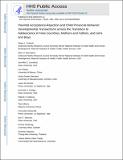| dc.contributor.author | Diane L. Putnick, Marc H. Bornstein, Jennifer E. Lansford, Lei Chang, Kirby Deater-Deckard, Laura Di Giunta, Kenneth A. Dodge, Patrick S. Malone, Paul Oburu, Concetta Pastorelli, Ann T. Skinner, Emma Sorbring, Sombat Tapanya, Liliana Maria Uribe Tirado, Arnaldo Zelli, Liane Peña Alampay, Suha M. Al-Hassan, Dario Bacchini, and Anna Silvia Bombi | |
| dc.date.accessioned | 2020-08-04T09:45:29Z | |
| dc.date.available | 2020-08-04T09:45:29Z | |
| dc.date.issued | 2018-10 | |
| dc.identifier.uri | https://repository.maseno.ac.ke/handle/123456789/1797 | |
| dc.description | The article can also be accessed via;https://www.ncbi.nlm.nih.gov/pmc/articles/PMC6152837/ | en_US |
| dc.description.abstract | Promoting children’s prosocial behavior is a goal for parents, healthcare professionals, and nations. Does positive parenting promote later child prosocial behavior, or do children who are more prosocial elicit more positive parenting later, or both? Relations between parenting and prosocial behavior have to date been studied only in a narrow band of countries, mostly with mothers and not fathers, and child gender has infrequently been explored as a moderator of parenting – prosocial relations. This cross-national study uses 1178 families (mothers, fathers, and children) from 9 countries to explore developmental transactions between parental acceptance-rejection and girls’ and boys’ prosocial behavior across three waves (child ages 9 to 12). Controlling for stability across waves, within-wave relations, and parental age and education, higher parental acceptance predicted increased child prosocial behavior from age 9 to 10 and from age 10 to 12. Higher age 9 child prosocial behavior also predicted increased parental acceptance from age 9 to 10. These transactional paths were invariant across 9 countries, mothers and fathers, and girls and boys. Parental acceptance increases child prosocial behaviors later, but child prosocial behaviors are not effective at increasing parental acceptance in the transition to adolescence. This study identifies widely applicable socialization processes across countries, mothers and fathers, and girls and boys. | en_US |
| dc.description.sponsorship | This research was funded by the Eunice Kennedy Shriver National Institute of Child Health and Human
Development grant RO1-HD054805, Fogarty International Center grant RO3-TW008141, and the intramural
program of the NIH, NICHD. | en_US |
| dc.publisher | Child and Family Research | en_US |
| dc.subject | prosocial behavior, parental acceptance, culture | en_US |
| dc.title | Parental Acceptance-Rejection and Child Prosocial Behavior: Developmental Transactions across the Transition to Adolescence in Nine Countries, Mothers and Fathers, and Girls and Boys | en_US |
| dc.type | Article | en_US |

